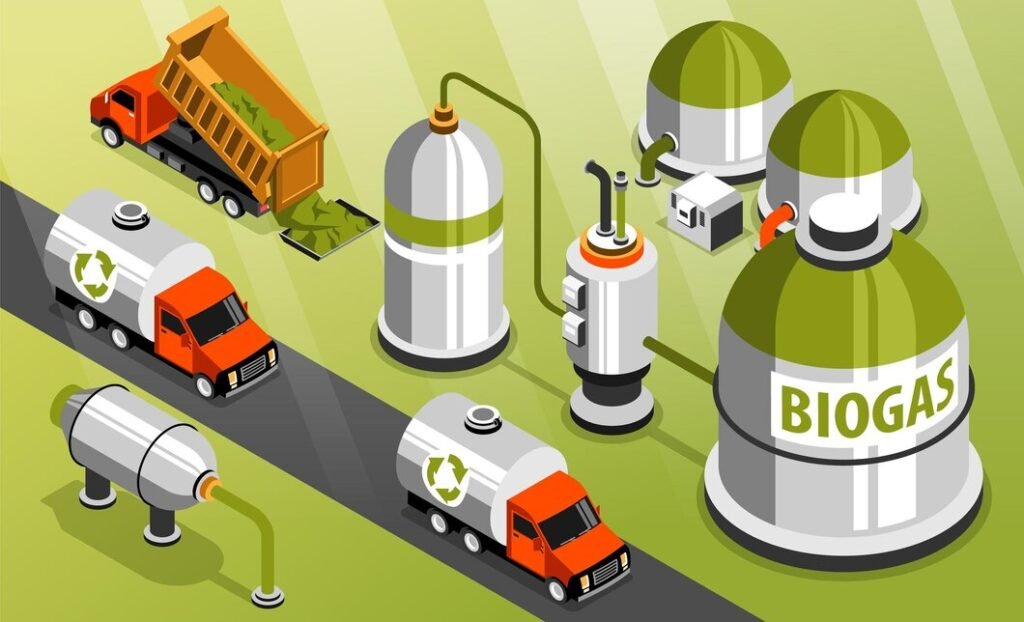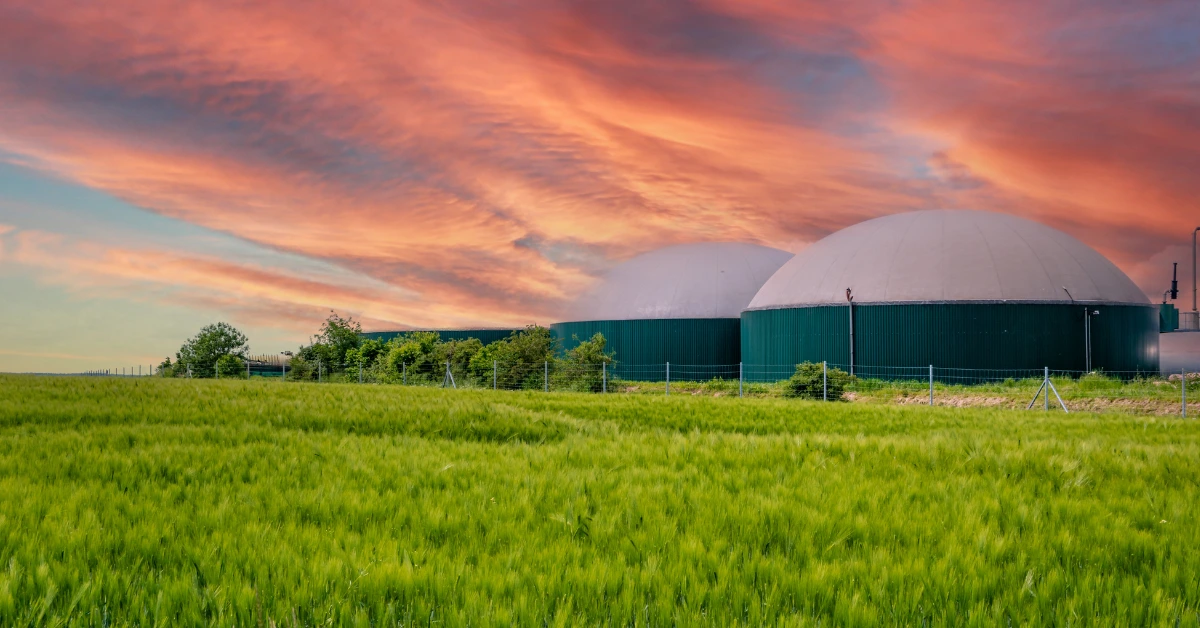Installing a Commercial Biogas Plant has become an increasingly best option for business industries aiming to prioritize sustainability and integrate renewable energy into their operations. In recent years, businesses across different industries have started to prioritize sustainability and the usage of renewable energy. One of the very promising solutions to help achieve these goals is the commercial biogas plant.
This system allows companies to turn organic waste into a very valuable resource of energy, while also reducing the overall environmental impact.
In this blog, we will explore the benefits of installing a commercial biogas plants for commercial use and how it can drive both environmental and economic advantages for businesses.
What is a Commercial Biogas Plant?

A commercial biogas plant is a facility that is well-designed to convert organic waste materials – like food, agricultural residues, waste, & animal manure – into biogas through the procedure of anaerobic digestion.
This biogas can be used for different energy purposes, like as generating electricity, producing heat, or used as a fuel for vehicles.
The byproducts of this process are referred to as digestate and can also be used as a completely nutrient-rich fertilizer.
Considering the rising focus on sustainability, businesses in different industries like food processing, agriculture, & waste management are increasingly looking for biogas plants for commercial use.
Top Benefits of Installing a Commercial Biogas Plant
- Reduction in Costs of Waste Management
One of the most obvious benefits of installing a commercial biogas plant is the reduction in the costs of waste disposal. By converting organic waste into biogas, several companies can significantly reduce the total amount of waste that is sent to landfills.
This not only saves on waste management fees but, at the same time, minimizes the environmental footprint.
For several businesses that are dealing with large volumes of organic waste, like as food manufacturers or farms, biogas plants offer a very cost-effective solution to optimally handle excess waste.
- Generation of Renewable Energy
Biogas plants produce a renewable source of energy that can be utilized in different ways. The methane-rich gas that is generated during the process of anaerobic digestion can be used to power equipment, generate electricity, or produce heat for industrial operations.
Companies that install a biogas plant can often reduce their overall dependence on fossil fuels, lowering their costs of energy while contributing to the greener energy grid.
- Lower Emissions of Carbon
By opting to use a commercial biogas plant to convert waste into energy, businesses can significantly lower their emissions of greenhouse gas. Methane is a potent greenhouse gas that would otherwise be released into the atmosphere when organic waste decomposes in landfills.
Capturing this methane and then using the same as a source of fuel instead can dramatically reduce the carbon footprint of a company.
Additionally, several business organizations that opt to invest in commercial biogas production can earn carbon credits. These carbon credits can be sold to other businesses as part of emissions trading schemes.
- Reduction of Pests and Odors
Large amounts of organic waste often result in creating unpleasant odors that attract different kinds of pests like as insects and rodents. A biogas plant for commercial use provides a controlled environment for waste management, reducing these nuisances.
By processing organic waste into an anaerobic digester, this plant can likely eliminate the strong odors associated with the decomposition of waste & helps maintain a cleaner and safer work environment.
- Production of High-Quality Fertilizer
The byproduct that is obtained from the process of biogas production is called digestate, which is a nutrient-rich material. It can be fruitfully used as a natural fertilizer.
This provides an additional benefit for several industries that are involved in landscaping or agriculture, as the digestate can be applied directly to crops or sold to several other businesses.
The usage of natural fertilizer improves the health of the soil, reduces reliance on chemical fertilizers, & supports a circular economy where waste is turned into very valuable resources.
- Savings on Cost & Generation of Revenue
By generating their renewable energy and reducing the costs of waste disposal, companies that install a commercial biogas plant can realize significant savings on cost.
Moreover, several businesses may also generate considerably high revenue by selling back the excess energy to the grid by providing the surplus digestate to agricultural markets.
For instance, countries that offer feed-in tariffs for the generation of renewable energy allow companies to sell biogas-generated electricity at a very premium price, further boosting their overall bottom line.
- Energy Independence for Companies
A commercial biogas plant provides companies with a greater level of energy independence. It is made possible by allowing them to produce their energy on-site.
This specifically helps in mitigating the impact of fluctuations in energy prices & supply chain disruptions. It makes the businesses less reliant on external energy suppliers.
For several industries that require a consistent & reliable source of energy, such as agricultural operations or food processing plants, the production of biogas can likely ensure that their energy needs are met, even during periods of grid instability.
- Support for Corporate Sustainability Goals
Several businesses today have set a few ambitious sustainability targets, & installing a commercial biogas plant can play a crucial role in meeting all these goals.
The usage of renewable energy from biogas reduces the reliance of the companies on fossil fuels & cuts down on carbon emissions.
Moreover, demonstrating a commitment to sustainability can likely improve the reputation of the companies, attract environmentally conscious consumers, & align with various government policies that promote the adoption of renewable energy.
- Long-term Investments & Payback
While the initial investment in a commercial biogas plant may seem to be significant, the long-term financial returns are often well worth it.
Depending on the size of the plant & also the volume of waste being processed, several companies can recoup their investment within a few years through revenue generation and cost savings. This technology is highly scalable and reliable at the same time.
The adoption of this technology helps businesses to expand their operations as per their growing need to process more amount of waste and generate more and more energy.
Challenges of Installing a Commercial Biogas Plant
Even though the benefits of commercial biogas production are significant, there are some challenges that one can come across:
- Initial Costs of Investment – The setup costs for a biogas plant can turn out to be high, especially for smaller businesses. However, government incentives, grants, & financing options are usually available to help offset the upfront costs.
- Maintenance & Monitoring – Like any industrial facility, a biogas plant requires ongoing maintenance & monitoring to ensure that it operates efficiently. The staff who work in a biogas plant must be trained to manage the system, & periodic servicing is necessary to prevent breakdowns.
Despite all these challenges, the long-term benefits make commercial biogas plants a sound investment for several companies that are looking forward to improving their sustainability efforts & reducing their operational costs.
Conclusion
Northamps commercial biogas plant is a sustainable waste management company in Kerala. The company’s biogas plants use anaerobic digestion to process organic waste and produce large quantities of biogas for commercial usage.
Investing in a commercial biogas plant offers the widest variety of benefits, from reducing waste management costs to generating renewable energy and lowering carbon emissions. You can contact our experts at Northamps for more information.


